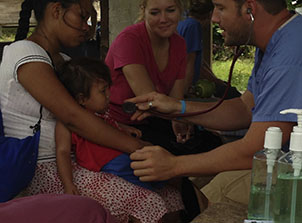A Child Named Baby By Dr. Karl Disque
We recently travelled to Bocas del Toro, Panama to assist with the
Floating Doctors
This is an amazing organization dedicated to bringing medical relief to remote coastal communities. We had heard stories of the need and poverty in the communities that they served and we were filled with anticipation of what we might experience.
On the first day of clinic in Ensenada, a mother brought in her beautiful 18-month-old daughter who was having difficulty breathing. Working with the interpreter, we were able to gather that the family cooked all foods indoors by open fire, leaving the house constantly smoky. Though this is a common practice in the area, it can lead to a plethora of respiratory problems among members of the community.
During the little girl’s treatment we got to know the family better, her mother told us that the little girl was currently named “Baby.” Because “Baby” seemed like an atypical Panamanian name, I asked her mother why she chose it. She explained that it is somewhat customary in the community to name children “Baby” until after their 2nd birthday, at which point the risk of the child dying was far less and they could choose a permanent name.
This completely floored me! Was the infant mortality rate so high it justified nameless children in the fear that they would not make it to their 2nd birthday? Thinking this must be an isolated incident; I contacted a former nurse anesthetist student of mine from a previous foundation trip I’d done to Ethiopia. She confirmed that outside of large cities, this was a very common practice in Ethiopia as well. She told me that although infant mortality had drastically decreased, it was still substantially higher than the rest of the world and people often feel too much uncertainty during infancy to merit naming the child.
Later that week, I met a dozen more children named “Baby” and I was reminded of Hans Rosling’s excellent TED talks where he amazingly presents evidence that the developing world is never far behind when it comes to health and prosperity. At that point, I was filled with gratitude to be a part of the transition to quality health care in underdeveloped countries! I thought of all of the health care providers that have supported the Save a Life Initiative through NHCPS and was humbled by how great their impact has been without them fully ever realizing it!

